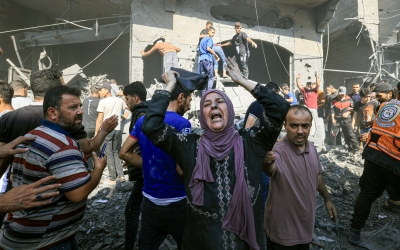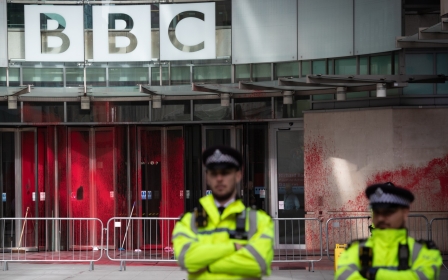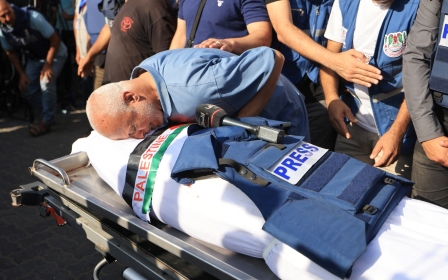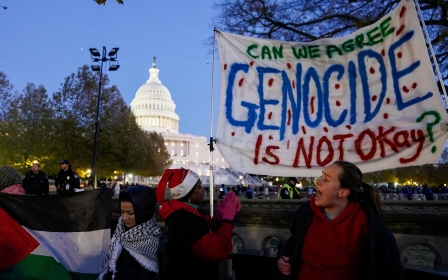War on Gaza: The voices that really matter are the journalists on the ground
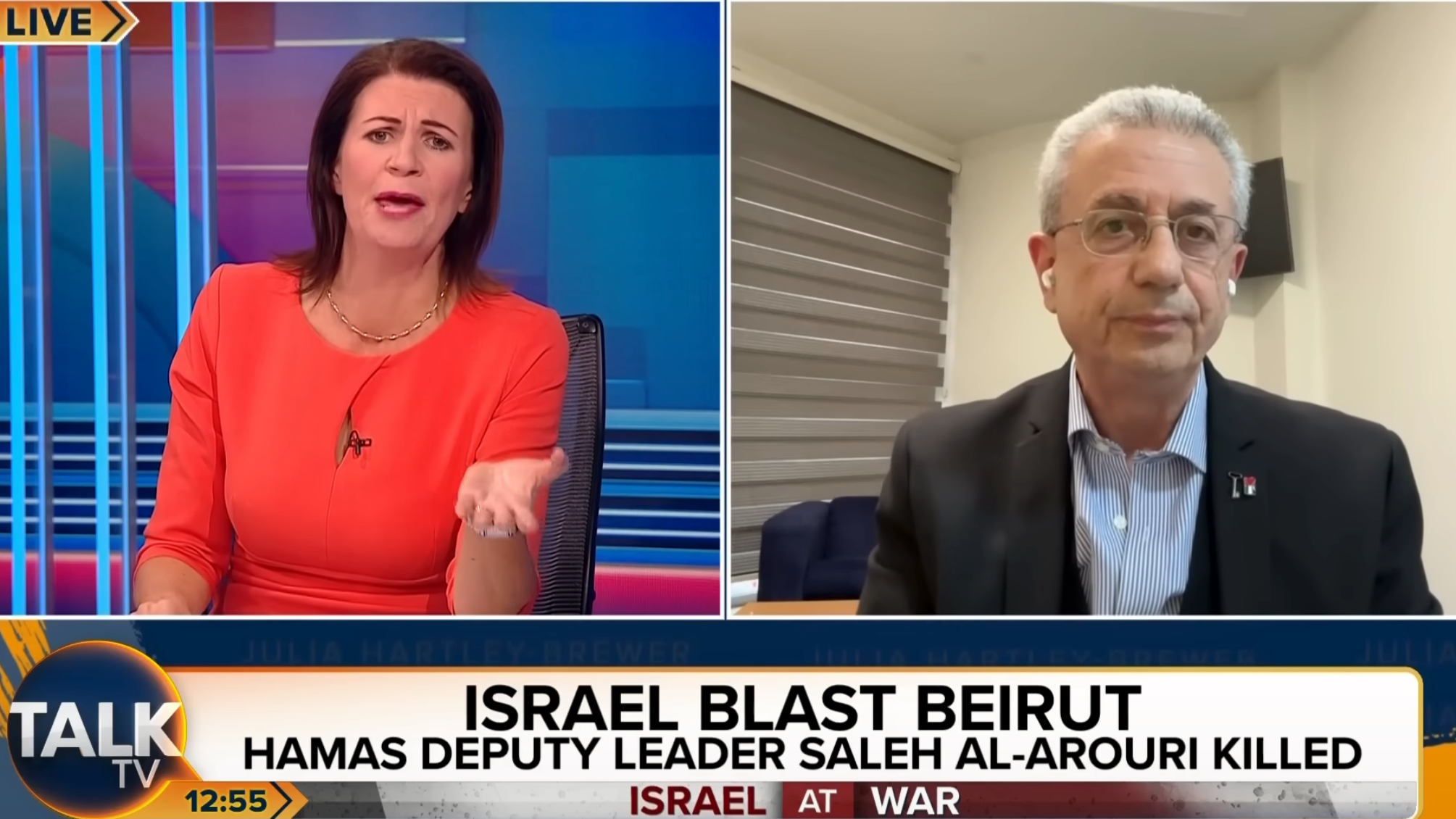
The New York-based Nation magazine recently published a harrowing account of the terrible challenges faced by journalists reporting from Gaza.
It described how, in common with the rest of the population, they are obliged to devote much of their time to obtaining food and drinking water.
There is almost nowhere to sleep, while the lack of electricity and signal for mobile phones can make filing copy borderline impossible, as our own Middle East Eye reporters have often found.
The bravery of the Gaza press corps is supreme. According to the Committee to Protect Journalists, more than 77 media workers have been killed in Gaza, Israel and Lebanon since 7 October. Many believe that reporters have been deliberately targeted, though the Israeli army denies this.
No one can deny, however, that the reporters in Gaza are heroes of our trade, risking their own and their families' lives in conditions of immense hardship to tell the truth about conditions inside Gaza. To sum up: this is journalism at its most awesome, bravest, sacrificial and, above all, necessary.
New MEE newsletter: Jerusalem Dispatch
Sign up to get the latest insights and analysis on Israel-Palestine, alongside Turkey Unpacked and other MEE newsletters
This week, however, we saw an example of journalism at its worst. Julia Hartley-Brewer, a presenter on London-based TalkTV, launched a rant against Palestinian politician Mustafa Barghouti, accusing him of misogyny ("not used to a woman talking") in a set of remarks that left her open to claims of racial stereotyping.
Barghouti handled the situation with calm and courtesy, refusing to become flustered or driven off course. One would expect no less from an internationally respected Palestinian politician who has survived time in Israeli police detention and has dealt with far more dangerous and formidable opponents than Hartley-Brewer.
Generating anger
It is thus tempting to dismiss the discourteous exchange on TalkTV as a matter of no consequence. But I think it is worth lingering on this encounter, which tells us a great deal about how the western media works - in particular, the often bigoted and racist coverage of the war in Gaza.
Bear in mind that Hartley-Brewer is not remotely the worst offender. We were colleagues at the Evening Standard and Sunday Express a quarter of a century ago. She's an intelligent person with a degree in philosophy, politics and economics from Oxford University. At one point, she worked as a reporter at the Guardian, and comes from a respected Labour Party family.
Follow Middle East Eye's live coverage of the Israel-Palestine war
Today, however, she has become part of a system of reporting that is about attracting attention and generating anger. Hartley-Brewer exemplifies this by setting herself up to be far more important than either the story or her guest. She needs reminding that a proper journalist should always try not to be part of the story.
This type of journalism doesn't allow for complexity or two points of view. It reduces complex subjects to simple solutions, which can appeal only to people who know nothing about the matter under discussion. In this way, it debases discourse and poisons our public life.
When it comes to the conflict in Gaza, this kind of journalism dehumanises Palestinians. I wonder whether Hartley-Brewer would have abused a senior British politician, however obtuse he seemed, with the contempt she handed out to Barghouti.
They sit in warm, pleasant studios where they earn six-figure sums for their opinions. They take no risks and convey no truths
In general, western journalists tend to treat Israeli politicians with much more respect than Palestinian officials. Here's a topical case in point: on Thursday, LBC presenter Iain Dale interviewed the Israeli ambassador to the UK, Tzipi Hotovely.
Hotovely has made many shocking statements that should put her beyond the pale. She has rejected the two-state solution, and denied both Palestinian rights and the Nakba. Even so, she regularly gets invited on British media.
Dale treated her with courtesy and respect. I am not criticising Dale: his soft-spoken approach might have encouraged Hotovely to make a series of revelatory remarks, including her terrifying warning that Israel would target "every school, every mosque, every second house".
False stories
But it is fair, I think, to compare Dale's courteous treatment of a senior Israeli official uttering borderline genocidal remarks with the insults hurled by Hartley-Brewer towards one of Palestine's most respected and measured politicians.
Throughout the Gaza war, the media discourse has favoured the Israeli side. Again and again, false or unchecked stories emanating from Israeli sources have been treated with respect. An investigation by Declassified UK showed that the claim by an Israeli news channel that "40 babies/children were beheaded" in October was run uncritically on the front page of almost every British newspaper - despite being untrue.
The same happened with Israeli claims that al-Shifa hospital in Gaza was really a Hamas command centre. "Israel can exaggerate or fabricate claims," Declassified noted, "paving the way for an unrelenting operation of ethnic cleansing, safe in the knowledge British media will sing from the same hymn sheet."
I am haunted by one other consideration. It is not just that western commentators, columnists and chat show hosts often don't know what they are talking about. It's not even that they pretend they do.
It's the comfort of their lives. They sit in warm, pleasant studios where they earn six-figure sums for their opinions. They take no risks and convey no truths.
If there is one lesson to be learned from Hartley-Brewer's recent outburst, it's this: we should pay much less attention to journalists like her, and much more to those incomparably brave reporters risking their lives every minute of the day to tell the world what's really going on in Gaza. Many of them, Hartley-Brewer may be interested to learn, are women.
The views expressed in this article belong to the author and do not necessarily reflect the editorial policy of Middle East Eye.
Middle East Eye delivers independent and unrivalled coverage and analysis of the Middle East, North Africa and beyond. To learn more about republishing this content and the associated fees, please fill out this form. More about MEE can be found here.



